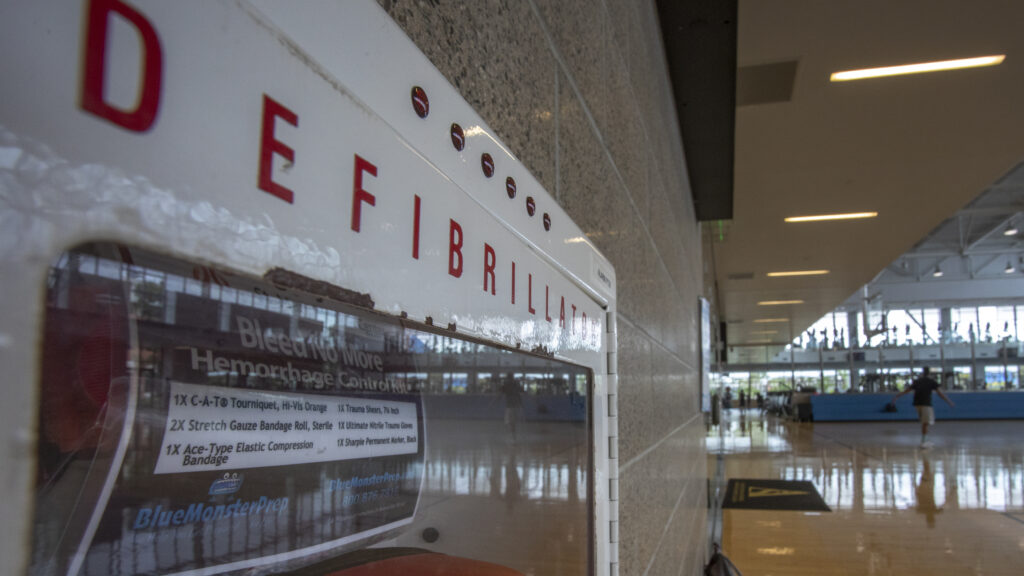You’ve probably heard of Damar Hamlin, who as starting safety for the Buffalo Bills has helped lead his team to a 3-1 record to start the National Football League season. Damar survived a cardiac arrest during a Monday Night Football game in January 2023, with more than 60,000 people watching in person and another 23 million tuned in.
You’ve probably never heard of Joshua Pierce. Ten years ago, when Joshua was 14, he suffered a cardiac arrest while playing in a high school football game in Ozark, Arkansas. A sell-out crowd? Hardly. A national TV crew? Not quite.
advertisement
Yet Damar and Joshua are both alive for the same reason: Within seconds, people acted to administer CPR, use an automated external defibrillator (AED), and provide other lifesaving care. Bills team trainers and physicians treated Damar within 10 seconds of his collapse and an ambulance was on the field in less than five minutes. In Joshua’s case, four nurses raced down from the stands to perform CPR, a coach grabbed a portable defibrillator, an ambulance brought him to a medical center, and a helicopter airlifted him to a children’s hospital.
As Joshua says, if not for the heroic actions of spectators, coaches and teammates, “I would not be here today.”
That’s the message the American Heart Association — along with cardiac arrest survivors, families who have lost a loved one to cardiac arrest, and grassroots advocates nationwide — is delivering as we push for Congress to pass bipartisan legislation to help ensure students and staff in schools nationwide are prepared for cardiac emergencies. The House has done its part — lawmakers last week passed the Cardiomyopathy Health Education, Awareness, Research and Training in the Schools (HEARTS) Act by voice vote. A similar bill, the Access to AEDs Act, has bipartisan support in the Senate but has been held up in committee. Now the Senate needs to do its job and get this bill over the finish line before Congress adjourns at the end of the year.
advertisement
In the United States, 90% of the more than 350,000 people who suffer cardiac arrests outside of a hospital each year do not survive the event. With the right resources, training and plans in place, schools can help dramatically change those odds. That’s where the HEARTS Act and the Access to AEDs Act come in. These bipartisan bills would create a federal grant program to support CPR and AED training of students, staff, and sports volunteers, while helping schools purchase AEDs and create emergency response plans.
Cardiac arrest — when the heart suddenly and unexpectedly stops pumping — strikes between 7,000 and 23,000 youth under age 18 outside of a hospital annually. Student athletes are 3.5 times more likely to experience a cardiac arrest than non-athletes. Cardiac emergency response plans, which should include calling 911 immediately and rapidly administering CPR and an AED, are essential components of the chain of survival, which can mean the difference between life and death during those critical first moments before emergency medical personnel arrive. For every minute without CPR, the chances of survival drop by 10%. But having a cardiac emergency response plan in place can more than double survival rates. Approximately 70% of children survive cardiac arrest in schools with AEDs.
Thirteen states — Alabama, Florida, Georgia, Illinois, Kansas, Kentucky, Maryland, Michigan, Mississippi, Ohio, Oklahoma, Tennessee and West Virginia — have passed legislation this year requiring schools to develop cardiac emergency response plans. Several additional states are poised to follow suit. The Smart Heart Sports Coalition, which was launched by the NFL and whose founding members include the American Heart Association, is working to pass these lifesaving policies in all states. Congressional legislation will bolster state efforts to help ensure schools have adequate resources to implement these plans and acquire the necessary tools to respond to a cardiac emergency. The legislation will save lives — but the Senate needs to follow the House’s lead and pass it.
advertisement
Following his cardiac arrest, Damar Hamlin is playing NFL football again, even securing his first career interception. A decade after collapsing on the football field, Joshua Pierce is married, working for a local bank, and living a healthy life. Joshua’s charge to Congress is clear: “Congress must make sure that in schools across the country, people know what to do if someone experiences a cardiac arrest like I did.”
Wise words from a young man given the gift of life. I urge Congress to listen, and to act.
Nancy Brown is chief executive officer of the American Heart Association.

